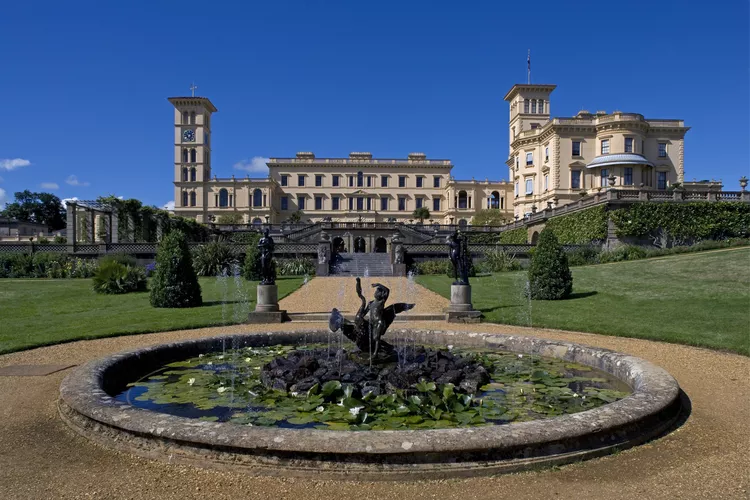Osborne House on the Isle of Wight
Osborne House on the Isle of Wight served as Queen Victoria’s private family home for 50 years. This stunning retreat was designed by her consort, Prince Albert, alongside master builder Thomas Cubitt, who also contributed to significant areas in London including Bloomsbury and Battersea Park.
Architecturally styled as an Italianate palazzo, the house takes full advantage of its seaside location on the northeastern part of the island, near Cowes, renowned for its sailing regattas.
History
Upon seeing Osborne for the first time, Queen Victoria reportedly expressed, “It is impossible to imagine a prettier spot.” From 1843 to 1845, the royal family leased an 18th-century estate but ultimately purchased the land in 1845, commencing the creation of the remarkable house seen today. Designed as a summer holiday home, it also served as a retreat from formal court life in London and Windsor, allowing the royal couple to host diplomats and dignitaries in a more relaxed environment compared to the Palace or Castle.
Originally, Osborne House lacked a ballroom; consequently, Queen Victoria’s entertainments occurred outdoors during the summer on the lawns. In 1892, the Durbar Wing expansion introduced a grand reception room along with the exquisitely decorated Durbar Room.
Post Queen Victoria’s passing, the residence remained private rather than royal. King Edward VII, however, chose to gift it to the nation in 1902, making portions accessible to the public by 1904.
Throughout its history, Osborne House has functioned as a convalescent hospital for military personnel and a naval college. English Heritage took management duties in 1986, progressively restoring and reopening more areas of the estate.
Things to See at Osborne House
:max_bytes(150000):strip_icc():format(webp)/GettyImages-530386028-5c1cd6e346e0fb0001f2a6fe.jpg)
A visit to Osborne House provides access to the private rooms of Victoria and Albert, which remained sealed until 1954 following King Edward VII’s orders. Here’s what to anticipate during your visit:
- Family Rooms: These intimate rooms offer insights into the lives of Albert, Victoria, and their nine children. The nursery has been accurately restored, showcasing its historical furnishings, along with the bedroom where the queen passed in 1901 and Albert’s private suite that remains virtually untouched.
- The State Rooms: The rooms, where the queen received illustrious guests and managed state affairs, include a Council Room for Privy Council meetings, a formal dining room dating back to 1850, and a lavish drawing room adorned with yellow satin and mirrors.
- The Durbar Room: This state room features intricate Indian-style decor, highlighting Queen Victoria’s title as Empress of India. The room showcases designs from Lockwood Kipling and master carver Bhai Ram Singh.
- The Queen’s Beach and Bathing Machine: Opened to the public in 2012, the private beach is perfect for swimming and picnicking. During summer, traditional Punch and Judy shows are offered. Visitors can also explore Queen Victoria’s unique bathing machine, a Victorian innovation for modesty while swimming in the ocean.
- The Swiss Cottage: Located a short distance from the main house, this Swiss-style chalet was constructed for Victoria and Albert’s children to learn domestic skills, including cake-baking with child-sized utensils.
How to Visit
The Isle of Wight, characterized by its diamond shape, is situated in the Solent, requiring travel via ferry or hovercraft. Taxis are readily available at the ports to reach Osborne House conveniently.
- Red Funnel Ferries operates car ferries from Southampton to East Cowes, located just 1.5 miles from Osborne House.
- Wightlink Ferries provides rapid catamaran services from Portsmouth Harbour Rail Station to Ryde, approximately seven miles away.
- HoverTravel offers hovercraft passenger services between Southsea, Portsmouth Harbour, and Ryde, taking only 10 minutes.
Osborne House and its grounds are open to visitors year-round, though hours vary with the seasons. Therefore, it’s advisable to check the website for current opening times and fees.
What to See Nearby
While visiting the Isle of Wight, consider exploring:
- The Needles: Admire these stunning sea stacks from The Battery, a historic gun emplacement managed by the National Trust.
- The Needles Chair Lift: This chair lift provides magnificent panoramic views from the cliffs towards the beach.
- Cowes: This charming sailing village offers delightful shopping and dining experiences, along with the chance to view magnificent yachts.
- Dinosaur Isle: A perfect destination for families, showcasing the many significant dinosaur fossils discovered on the Isle of Wight.




